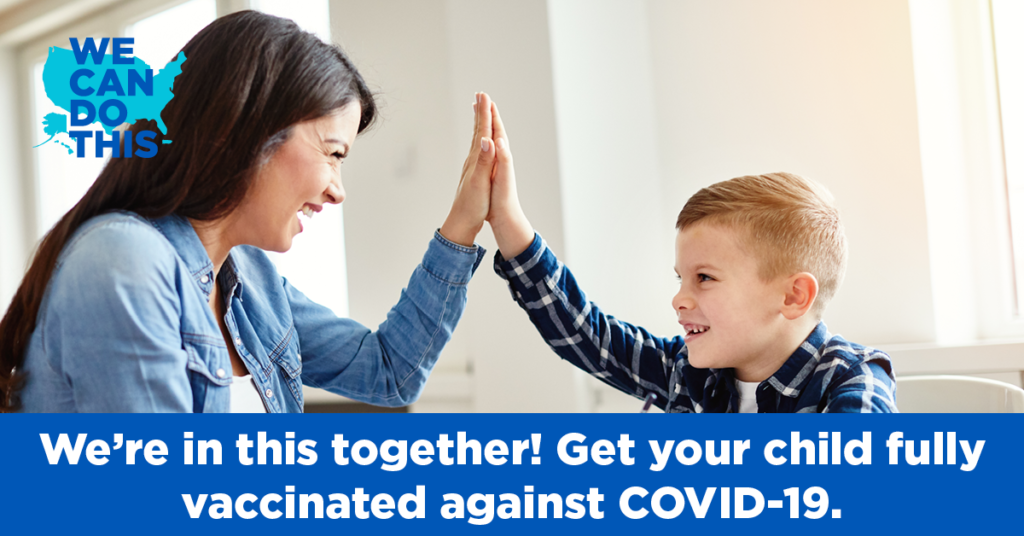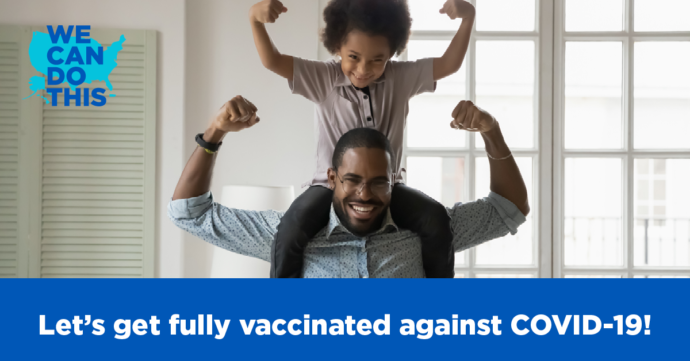Insights and Resources from our Recent Roundtable
National PTA’s urgent work to build vaccine confidence is well underway in 19 communities across the country. Recently we hosted a virtual roundtable to equip PTA leaders with accurate information and practical strategies to help address vaccine hesitancy and leverage every strategy to make schools safer for children and staff and maximize in-person learning. (Note: National PTA does not have a position on COVID vaccine mandates.)
Here, we share highlights from the conversation and resources local PTAs can put into practice right away.
Take Action to Keep Kids Safely in School: What Your PTA Can Do to Address Vaccine Hesitancy
Roundtable, February 2, 2022
- Shaton Berry, Healthy Minds Ambassador, National PTA
- Kate King, DNP, M.S., RN, LSN, President Elect, National Association of School Nurses
- Laura Mitchell, Vice President of Advocacy, Montgomery County Council of PTAs, and Whole Child Fellow, National PTA
- Michael Scott, CHES, Senior Program Manager, The Center for Black Health and Equity
- Special Guest: Vice Admiral Vivek Murthy, M.D., United States Surgeon General
- Facilitator: Anna King, President, National PTA
- Co-Facilitator: Nathan R. Monell, CAE, Executive Director, National PTA
Vice Admiral Vivek Murthy: The Surgeon General kicked off the conversation by thanking the PTA leaders who are already hard at work leading vaccine confidence campaigns in their communities. He noted the important role PTAs and community organizers can make in a moment like this, serving as a bridge to accurate and accessible information that is attuned to local concerns.
As a parent of young children himself, Dr. Murthy also expressed empathy toward any fully vaccinated parents and caregivers that may feel cautious about vaccinating their children, and acknowledged it is important that hesitant parents and caregivers be given the opportunity to express their concerns and be provided factual information. He observed that misinformation about vaccines circulating on social media platforms may have caused some parents and caregivers to become fearful. He noted that trusted messengers like local pediatricians, fellow parents, and other respected community members are likely the best positioned to help assuage such fears.
Kate King: School nurses are on the frontlines of the pandemic, but they can’t do this work alone. She urged collaboration among parent groups, school nurses, local boards of health and cultural organizations to help families overcome misinformation and make better-informed vaccine decisions. She urged parents and PTA leaders to speak with their own school nurse to access their recommended local resources. (If your school doesn’t have an assigned nurse, advocate for getting one!) Kate recommended several additional sources for reliable vaccination information:
- The Centers for Disease Control (CDC)
- Your state’s School Nurses Association
- Your local health department, pediatrician’s office or school district website
Laura Mitchell: PTAs have a big role to play in helping our communities reach a safer post-pandemic stage. The key: Talk about vaccination everywhere! When families get comfortable asking questions from a trusted source, like their PTA, they are more likely to get vaccinated. Mitchell shared several successful conversation strategies from the Montgomery County Council PTA, who recently partnered with doctors to host “Vax Facts” webinars in multiple languages, teamed up with schools to get out the word about vaccine clinics, and regularly posts information in high-traffic locations, including grocery stores and their schools’ digital platforms.
Shaton Berry: When we help families make informed vaccine decisions, we’re supporting their health and mental health by reducing overall anxiety. Local PTA leaders don’t need to be health experts to navigate these conversations – they can tap into the National PTA family for ideas, tools and support. Shaton recommended three resources in particular:
- National PTA COVID-19 Resources: One-stop shop for toolkits, posters and other resources to address vaccine hesitancy, offer factual information and support positive local action.
- National PTA Healthy Minds Initiative: Resources to help families prioritize mental health, including step-by-step discussion guides, event-planning resources, customizable PowerPoints and facilitator guides.
- State and regional partners: Try connecting with your regional or state PTA, neighboring local PTAs and your state’s Department of Health and Human Services.
Michael Scott: African-Americans continue to be disproportionately impacted by COVID-19, and this population is less likely to be vaccinated and more likely to experience severe illness or death due to the pandemic. It is important to acknowledge the historical events that have contributed to vaccine hesitancy among the Black community and other historically marginalized groups, and to recognize the racial inequity that persists today in our health care experiences. Scott highly recommends these two resources, developed by or in partnership with The Center for Black Health & Equity:
- The Truth Check: Tips and tools for spotting and addressing COVID-19 misinformation.
- Power and Immunity: A toolkit for sharing science-based information about vaccines.

As we reflect on the learnings from this round table, National PTA wants to recognize and acknowledge that some PTAs may be having a hard time determining and navigating your role in increasing vaccine confidence within communities where this issue has become especially polarizing.
In communities with a lot of hesitancy, your PTA may want to start by facilitating a forum for people to express their concerns and hear from trusted local messengers (such as pediatricians, coaches, and clergy). Your PTA can choose a couple of fact-based COVID-19 resources to share with the families who participate in the forum.
Whereas in other communities where the issue is less around hesitancy and more around eliminating barriers to access. In that case, your PTA may want to help support a vaccine clinic – or host one! – and use the power of PTA to address issues like transportation, translation services, food, awareness and so forth.
We hope you’ll find these insights and specific resources helpful. Keep your eye out for more updates from National PTA in the weeks ahead as we continue building vaccine confidence together. Together, we can do this!





